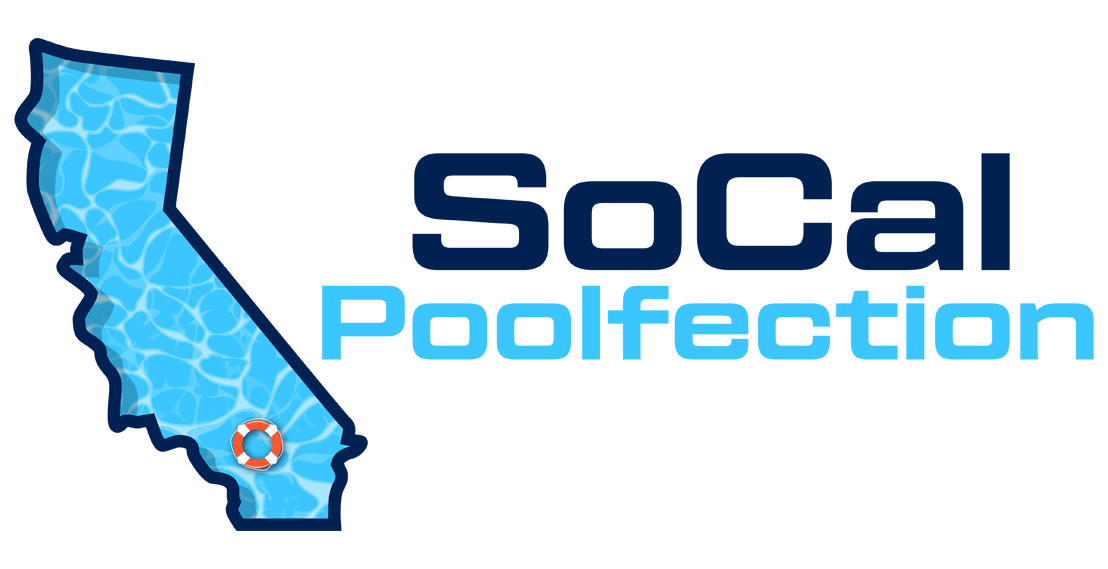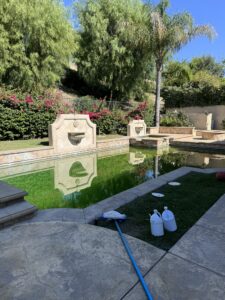Keeping your pool clean, safe, and inviting is all about balance—especially when it comes to managing chlorine and conditioner, also known as cyanuric acid (CYA). In Simi Valley, where hot summers and bright sunshine dominate the pool season, it’s critical for homeowners to understand how these chemicals interact. At SoCal Poolfection, we’re here to demystify CYA, explain how it relates to chlorine tabs, and help you avoid a common but serious pool maintenance issue: over-stabilization.
What Is Conditioner (Cyanuric Acid)?
Pool conditioner CYA a.k..a. Cyanuric acid, often referred to as conditioner or stabilizer, is a chemical added to pools to protect chlorine from breaking down too quickly under ultraviolet (UV) light. Without CYA, chlorine dissipates rapidly in the hot California sun—especially in sunny cities like Simi Valley.
Benefits of CYA:
Shields chlorine from UV degradation
Helps maintain a consistent chlorine level
Reduces the need for frequent chlorine additions
However, too much of a good thing can cause problems.
Ideal CYA Levels for Pools in Simi Valley
The recommended CYA range for outdoor residential pools is 30 to 50 ppm (parts per million). In regions with intense sunlight like Simi Valley, slightly higher levels (up to 70 ppm) may be beneficial during peak summer.
Target range:
30–70 ppm (ideal for summer months)
Never exceed 100 ppm
High CYA levels reduce chlorine’s ability to sanitize effectively, even if your test strip shows “enough” chlorine.
What Are Chlorine Tabs and How Do They Work?
Chlorine tablets, often called tabs, pucks, or chlorine discs, are a popular way to sanitize pools. They slowly dissolve and release chlorine over time, making them convenient for weekly pool service and at-home use.
Common types of chlorine tabs:
Trichlor (trichloro-s-triazinetrione) – contains 90% chlorine and CYA
Each tab contains not only chlorine but also CYA, meaning you add stabilizer every time you add a tab.
The Problem: Over-Stabilization
Over time, continued use of chlorine tablets adds more and more CYA to your pool. Since CYA doesn’t evaporate or break down easily, it builds up in the water. This is especially true in Simi Valley, where pools are used frequently and tabs are often the go-to sanitizer.
Symptoms of over-stabilization:
Cloudy water despite normal chlorine levels
Algae growth even with adequate chlorine
Slow chlorine reaction times
Higher need for shocking the pool
Real Example:
We recently serviced a Simi Valley homeowner whose chlorine tabs had pushed their CYA to 150 ppm. Although their test strip showed 5 ppm of chlorine, algae was still growing. After draining 30% of their pool and switching to liquid chlorine, the water cleared in days.
How to Test for CYA
CYA is not included in most basic test strips. We use professional-grade testing kits to measure CYA during weekly pool service. You can also find specialty test strips labeled for cyanuric acid.
If your pool has had no water replacement for several months and uses chlorine tablets exclusively, it’s wise to test for CYA.
How to Lower High Pool Conditioner Levels
Unfortunately, there are no chemical treatments that remove CYA. The only way to reduce it is by diluting the water.
Options include:
Partial drain and refill (10–30% of pool volume)
Reverse osmosis (less common and more costly)
Regular water replacement is the most cost-effective solution, especially in Simi Valley where pools experience evaporation and refill cycles naturally.
Alternatives to Chlorine Tabs
If your CYA levels are high or climbing, consider switching to other forms of chlorine that do not contain stabilizer:
1. Liquid Chlorine (Sodium Hypochlorite)
No added CYA
Easy to add
Works quickly
2. Cal-Hypo (Calcium Hypochlorite)
No CYA
Adds calcium, which may be a factor in hard water areas
3. Salt Systems
Generate chlorine on-site from salt
Controlled CYA levels
Lower chlorine demand with consistent output
Our pool service team can help transition your pool to a better system if over-stabilization is affecting your water quality.
Best Practices for CYA and Tab Use in Simi Valley
1. Test CYA Every Month
Especially during summer when tablet use is highest, monitor your stabilizer levels monthly.
2. Use Tabs Seasonally
Tabs are great for summer months when UV protection is most needed. In cooler months, consider switching to liquid chlorine.
3. Drain Part of Your Pool Each Year
Draining 20–30% of your pool annually helps reset your CYA levels.
4. Combine Tabs with Liquid Chlorine
Use tabs as a chlorine supplement, not the only source. This reduces the rate of CYA buildup.
SoCal Poolfection’s Approach to Balanced CYA Levels
As part of our weekly pool service in Simi Valley, we:
Test CYA monthly and track trends
Rotate chlorine types based on season
Advise on when to drain/refill
Offer salt system upgrades to reduce chlorine reliance
Educate homeowners on best pool chemistry practices
We take the guesswork out of managing pool conditioner and ensure your pool stays balanced all season long.
FAQs About Conditioner and Chlorine Tabs
How often should I test for CYA?
Monthly testing is recommended, especially during peak chlorine tablet use.
Can I remove CYA without draining?
No. Dilution through water replacement is the only effective method.
What happens if I ignore high CYA levels?
Your chlorine will become less effective, increasing the risk of algae, cloudiness, and bacteria.
Are all chlorine tablets the same?
Most tabs are trichlor-based and include CYA. Some dichlor tabs also add pool conditioner.
What’s the ideal CYA level for pools in Simi Valley?
55–70 ppm in summer, lower during cooler seasons.
Final Thoughts – Conditioner (CYA) and Chlorine Tabs: Use Them Wisely
Pool Conditioner plays a vital role in protecting your chlorine from the sun, but too much can do more harm than good. In Simi Valley’s sunny climate, chlorine tabs are a popular choice, but using them year-round without monitoring CYA levels can lead to over-stabilization and recurring water issues.
At SoCal Poolfection, we help Simi Valley pool owners maintain perfect water chemistry with balanced use of chlorine tabs, conditioners, and modern pool care strategies. If you’re unsure about your stabilizer levels or seeing signs of chlorine inefficiency, let our experts take a look.
SoCal Poolfection – Pool Chemistry Experts in Simi Valley
Call/Text: (805) 387-4498
Visit: www.socalpoolfection.com


